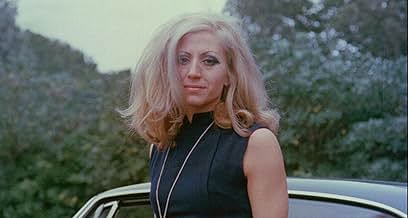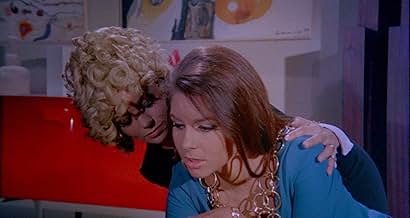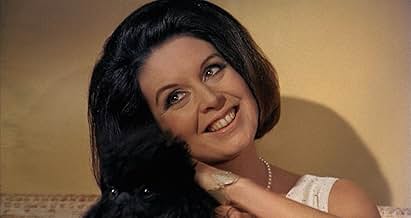CALIFICACIÓN DE IMDb
5.7/10
1.1 k
TU CALIFICACIÓN
Agrega una trama en tu idiomaA night of attempted seduction is recalled from the perspectives of the woman, the man, a lecherous doorman and a psychoanalyst.A night of attempted seduction is recalled from the perspectives of the woman, the man, a lecherous doorman and a psychoanalyst.A night of attempted seduction is recalled from the perspectives of the woman, the man, a lecherous doorman and a psychoanalyst.
- Dirección
- Guionistas
- Elenco
- Premios
- 1 premio ganado en total
Michael Hinz
- Unconfirmed Role
- (solo créditos)
Marina Cavorgna
- The Bananas band member
- (sin créditos)
Sante Lucerlini
- Duccio
- (sin créditos)
- …
Michael Maien
- Pino
- (sin créditos)
- …
Robert H. Oliver
- Giorgio
- (sin créditos)
- …
Huguette Verton
- The Bananas band member
- (sin créditos)
Opiniones destacadas
It's ironic that Italian horror maestro Mario Bava might have made with this movie what is literally the best sex comedy ever. Not that that is saying a lot--American sex comedies generally range from awful to downright painful, and let's not even speak of British sex comedies. Italian and continental sex comedies are slightly better (but that may only be because they rarely bother to translate them to English so most of the lame jokes and wretched double entendres go over my head, and I just wait around for Edwige Fenech or whoever to take off her clothes again).
Since it was directed by the famed Mario Bava,this movie has been translated into English, but it has an intelligent, conceptual humor that really requires no translation. It's a comic variation on the Japanese melodrama "Rashomon" where a first date between a man and a woman is told from the very different perspectives of him, her, and the doorman. Of course, being a comedy there is no rape and murder as in "Rashomon", but simply a torn dress and scratched forehead. Also, where "Rashomon" eventually resolves the differing accounts with an objective fourth story, the fourth story here is told by a blowhard pop psychologist and is at least as implausible as the other three. The message here seems to be that the truth itself is subjective, which makes this more akin to "Last Year at Marienbad" than "Rashomon" (although it's a lot more fun than either). It's also very subversive--the doorman, for instance, interrupts his obviously very fabricated tale (involving lesbianism and swingers) at the worst times to clean his glasses or go get a pair of binoculars (to the hilarious chagrin of the lecherous milkman he's telling the story to).
The female lead is Daniela Giordano, a former Miss Italy. She was not nearly as ubiquitous in continental sex comedies as Edwige Fenech, but she's very memorable here. She is introduced to the audience bending over in a short skirt playing with her dog,"Coolie", so named she says because of his "coolie nose" (this is a joke people who only speak English might not get, but suffice it to say that Giordano has a really nice "coolie"). The male lead is Brett Halsey who appeared years later in several latter-day Lucio Fulci films. He's not quite as funny here, but at least this movie is SUPPOSED to be a comedy. Definitely recommended for Bava fans and non-Bava fans alike.
Since it was directed by the famed Mario Bava,this movie has been translated into English, but it has an intelligent, conceptual humor that really requires no translation. It's a comic variation on the Japanese melodrama "Rashomon" where a first date between a man and a woman is told from the very different perspectives of him, her, and the doorman. Of course, being a comedy there is no rape and murder as in "Rashomon", but simply a torn dress and scratched forehead. Also, where "Rashomon" eventually resolves the differing accounts with an objective fourth story, the fourth story here is told by a blowhard pop psychologist and is at least as implausible as the other three. The message here seems to be that the truth itself is subjective, which makes this more akin to "Last Year at Marienbad" than "Rashomon" (although it's a lot more fun than either). It's also very subversive--the doorman, for instance, interrupts his obviously very fabricated tale (involving lesbianism and swingers) at the worst times to clean his glasses or go get a pair of binoculars (to the hilarious chagrin of the lecherous milkman he's telling the story to).
The female lead is Daniela Giordano, a former Miss Italy. She was not nearly as ubiquitous in continental sex comedies as Edwige Fenech, but she's very memorable here. She is introduced to the audience bending over in a short skirt playing with her dog,"Coolie", so named she says because of his "coolie nose" (this is a joke people who only speak English might not get, but suffice it to say that Giordano has a really nice "coolie"). The male lead is Brett Halsey who appeared years later in several latter-day Lucio Fulci films. He's not quite as funny here, but at least this movie is SUPPOSED to be a comedy. Definitely recommended for Bava fans and non-Bava fans alike.
Mario Bava is best known for his dark, morid horror films, but he also worked outside of the genre on many different occasions. One such occasion yielded QUANTE VOLTE. . . QUELLA NOTTE, a delightful sex comedy patterned after Akira Kurosawa's 1950 classic RASHOMON. The story tells of a date gone awry, and the different perspectives on what in fact led to the man (Brett Halsey) having scratches on his forehead and the girl (Daniela Giordano)'s brand new dress being torn. Those viewers only familiar with Bava's horror films need to seek out this little known gem -- it reveals a more playful side of Il Maestro, and is an entertaining and endearing film in its own right. *** out of ****
Master director Mario Bava is best known for his horror films, and that's hardly surprising as films such as Blood and Black Lace and Black Sabbath certainly represent the best of his oeuvre - but he also made a few films outside of the horror genre, and Four Times That Night is surely one of the best. I can't say I'm a big fan of sex comedies, as while I enjoy seeing sex in movies; I tend to prefer it with a little more sleaze than what films like this tend to offer. However, by taking his central plot theme from the Akira Kurosawa masterpiece 'Rashomon', Bava has made a sex comedy that is interesting for the way it pans out, rather than because of the sex theme. The plot follows Gianni and Tina; a man and a woman that meet in a park. They end up going on a date together, but it ends mysteriously when Tina returns home with a ripped dress and Gianni is sporting a nasty looking scratch on his forehead. Both Tina and Gianni give their version of what happened on that night, and the story is given a third angle from Gianni's doorman.
It's clear that this film is never going to be as deep or as fascinating as Kurosawa's masterpiece, but as a slice of light entertainment; it works fine. Bava is famous for his use of lighting and technique in order to create atmosphere for his horror films, although this movie doesn't allow him to do that. That being said, Bava's fingerprints are all over the film; as the garish use of colour features prominently, and the seventies style is what helps to elevate the film above the usual level of a gentle sex themed comedy. The film benefits from the presence of Daniela Giordano; the sexy female lead whom Bava makes best use of at all opportunities. She is joined by Fulci muse Brett Halsey, as well as Dick Randall; a man more famous for his producing credits. Bava attempts to give the film some substance by way of a psychologist explaining how different people view the same events from different perspectives...but I find it hard to believe that three people could view the same event in such wildly differing ways. One slight criticism of the film is that it's not very funny...but it's fun enough, and worth seeing.
It's clear that this film is never going to be as deep or as fascinating as Kurosawa's masterpiece, but as a slice of light entertainment; it works fine. Bava is famous for his use of lighting and technique in order to create atmosphere for his horror films, although this movie doesn't allow him to do that. That being said, Bava's fingerprints are all over the film; as the garish use of colour features prominently, and the seventies style is what helps to elevate the film above the usual level of a gentle sex themed comedy. The film benefits from the presence of Daniela Giordano; the sexy female lead whom Bava makes best use of at all opportunities. She is joined by Fulci muse Brett Halsey, as well as Dick Randall; a man more famous for his producing credits. Bava attempts to give the film some substance by way of a psychologist explaining how different people view the same events from different perspectives...but I find it hard to believe that three people could view the same event in such wildly differing ways. One slight criticism of the film is that it's not very funny...but it's fun enough, and worth seeing.
Mario Bava, renowned for his gothic horror masterpieces, took an unexpected detour into the realm of sex comedy with "Quante volte... quella notte" (1971). This departure from his usual fare showcases Bava's versatility as a filmmaker, as he infuses the film with his signature visual flair and playful sensibilities.
The film's episodic structure presents a series of vignettes that explore the complexities of modern relationships and sexual dynamics. While some segments are more successful than others in terms of humor and insight, the overall tone remains lighthearted and charming. The ensemble cast delivers engaging performances, particularly in the more comedic moments, adding to the film's overall appeal.
However, "Quante volte... quella notte" is not without its flaws. The pacing can feel uneven at times, with some segments dragging on longer than necessary. Additionally, certain aspects of the film's portrayal of gender roles and sexual politics may come across as dated or problematic to modern audiences.
Despite its shortcomings, "Quante volte... quella notte" remains an enjoyable and often insightful diversion from Bava's more renowned works. While not a masterpiece, the film's lighthearted tone, charming performances, and occasional flashes of insight make it a worthwhile entry in the director's diverse filmography.
The film's episodic structure presents a series of vignettes that explore the complexities of modern relationships and sexual dynamics. While some segments are more successful than others in terms of humor and insight, the overall tone remains lighthearted and charming. The ensemble cast delivers engaging performances, particularly in the more comedic moments, adding to the film's overall appeal.
However, "Quante volte... quella notte" is not without its flaws. The pacing can feel uneven at times, with some segments dragging on longer than necessary. Additionally, certain aspects of the film's portrayal of gender roles and sexual politics may come across as dated or problematic to modern audiences.
Despite its shortcomings, "Quante volte... quella notte" remains an enjoyable and often insightful diversion from Bava's more renowned works. While not a masterpiece, the film's lighthearted tone, charming performances, and occasional flashes of insight make it a worthwhile entry in the director's diverse filmography.
Usually known for gothic horror flicks, Mario Bava took a break from that and made this sex comedy in 1971. "Quante volte... quella notte" depicts multiple people giving their accounts of a tryst that took place between a male model and woman whom he came across in the park.
A previous review compared this man to Akira Kurosawa's "Rashomon". I wouldn't have initially picked up on that, but I see the similarity. An obvious difference is that "Rashomon" is a multilayered movie while this is simply a fun romp. Personally I thought one scene missed a chance. During the part where the doorman is giving his version, he runs up and down the stairs to music. I thought that they should've used either Jacques Offenbach's "Orpheus in the Underworld" (commonly known as the can-can song) or Franz Liszt's "Hungarian Rhapsody #2" (commonly used in cartoons to evoke something building up; Daffy Duck and Donald Duck played it on the pianos in "Who Framed Roger Rabbit").
Otherwise, a fun movie. Daniela Giordano was a real piece of eye candy.
A previous review compared this man to Akira Kurosawa's "Rashomon". I wouldn't have initially picked up on that, but I see the similarity. An obvious difference is that "Rashomon" is a multilayered movie while this is simply a fun romp. Personally I thought one scene missed a chance. During the part where the doorman is giving his version, he runs up and down the stairs to music. I thought that they should've used either Jacques Offenbach's "Orpheus in the Underworld" (commonly known as the can-can song) or Franz Liszt's "Hungarian Rhapsody #2" (commonly used in cartoons to evoke something building up; Daffy Duck and Donald Duck played it on the pianos in "Who Framed Roger Rabbit").
Otherwise, a fun movie. Daniela Giordano was a real piece of eye candy.
¿Sabías que…?
- TriviaWhen asked about this film in the late 1990s, Pascale Petit (Esmeralda) stated not having the slightest recollection of having worked under Mario Bava's direction.
- ConexionesEdited into Twisted Sex Vol. 23 (2007)
Selecciones populares
Inicia sesión para calificar y agrega a la lista de videos para obtener recomendaciones personalizadas
- How long is Four Times That Night?Con tecnología de Alexa
Detalles
- Fecha de lanzamiento
- Países de origen
- Idiomas
- También se conoce como
- Four Times That Night
- Locaciones de filmación
- Productoras
- Ver más créditos de la compañía en IMDbPro
- Tiempo de ejecución
- 1h 23min(83 min)
- Relación de aspecto
- 1.85 : 1
Contribuir a esta página
Sugiere una edición o agrega el contenido que falta













